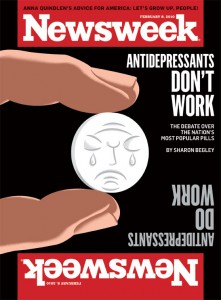Depression Increases Heart Disease Risk to Same Extent That Obesity, High Cholesterol Do
 In men, depression seems to be equal to obesity and high cholesterol in increasing heart disease risk. A German study about heart disease risk included 3,428 men between the ages of 45 and 74 who were observed over a period of 10 years.
In men, depression seems to be equal to obesity and high cholesterol in increasing heart disease risk. A German study about heart disease risk included 3,428 men between the ages of 45 and 74 who were observed over a period of 10 years.
In an article in the journal Atherosclerosis, lead researcher Karl-Heinz Ladwig reported that while high blood pressure and smoking are the most powerful risk factors for fatal cardiovascular disease, depression is comparable to obesity and high cholesterol levels. Depression accounts for about 15% of cardiovascular deaths.
Ladwig suggests that depression screening should be standard in patients with other risk factors for heart disease.
Editor’s Note: Long-term preventive treatment for depression may have the added benefit of preventing heart attacks. In people with two prior depressions, most guidelines now recommend lifetime continuation of antidepressant treatment.
5 Myths About Unipolar Depression
 Early this year, news stories such as Newsweek’s “The Depressing News About Antidepressants” and “Antidepressant Drug Effects and Depression Severity” in the Journal of the American Medical Association (JAMA) created an inadequate picture of the seriousness of clinical depression, and the importance of preventing recurrent episodes with long-term antidepressant treatment. (For a rebuttal, see Psychiatric Times.)
Early this year, news stories such as Newsweek’s “The Depressing News About Antidepressants” and “Antidepressant Drug Effects and Depression Severity” in the Journal of the American Medical Association (JAMA) created an inadequate picture of the seriousness of clinical depression, and the importance of preventing recurrent episodes with long-term antidepressant treatment. (For a rebuttal, see Psychiatric Times.)
The consequences of this distorted depiction of depression and its treatment are potentially dire for individuals’ health. Some of the popular myths about depression deserve critical review so that patients can make more informed decisions about their own treatment.
Myth 1: Depression is all in your mind
Myth 2: Depression is over-treated
Myth 3: Antidepressant efficacy barely exceeds that of placebo
Myth 4: Antidepressants should be stopped as soon as possible
Myth 5: Depression is a minor medical problem
Myth 1: Depression is all in your mind
This might seem valid, since depression is classified as a mental illness. But depression is not abstract, imaginary, or lacking a solid physical foundation. There is now overwhelming evidence that depression coincides with disturbances in multiple brain and body systems.

